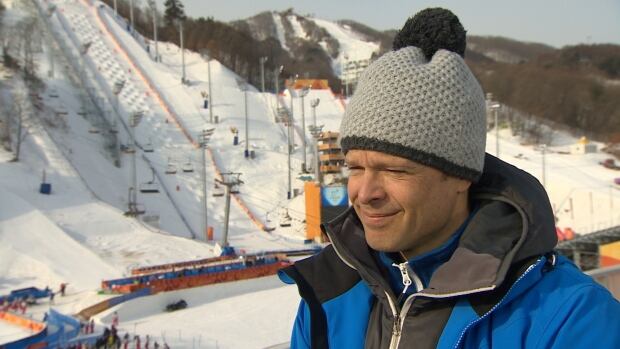Mount Gariwang, named for a 15th-century king whose own supply of ginseng was grown on the mountain, lies nearly an hour south of the region of Pyeongchang, South Korea.
Covered with 500-year-old trees, Gariwang has long been a protected park, and there was nothing to see for kilometres but a few small cottages built low on the hillside.
But now, the view has been dramatically interrupted by three ski runs incongruously cut into the side of the mountain, constructed specifically for the Olympic Games. Covered with artificial snow created from a local stream now diverted into a reservoir at the bottom of the ski runs, the course at what is now known as Jeongseon Alpine Centre looks awkwardly out of season against a backdrop of brown trees from a long, dry winter.
The decision by South Korea's Olympic committee to choose this site for the alpine events remains a source of deep upset in a country that still seems unsure how it feels about these Games.

Kyung Jun Kim is committed to holding officials to their word regarding preserving Mount Gariwang. (Jean-Francois Bisson/CBC)
"The government has made a promise to its citizens, to the world and to everyone," said Kyung Jun Kim from his home in nearby Manju. He's talking about the local Olympic committee's promise that it would repair the hillside after the Games, returning it to the way it was.
"I don't really trust their promise that they are going to restore the mountain," said Kim. "But, we have to make every effort to make it a reality."
When the International Olympic Committee awarded South Korea the games seven years ago, it insisted that the site for the alpine downhill speed events meet a list of specifications, in particular a vertical drop of 700 metres that would make the course one of the fastest ever at the Winter Games.
Local organizers settled on the protected mountain. Environmentalists such as Kim fought the effort to lift the mountain's protected status, but lost.

A long, dry winter has provided a contrasting backdrop to the snowy slopes. Meanwhile, South Korean corporate giant Hyundai has publicly floated the idea of using the gondola to ferry tourists. (Jean-Francois Bisson/CBC)
Now, as the Games draw to a close, he's worried the local government doesn't appear to have budgeted the millions of dollars necessary to clear the site of all that was constructed here to host the competition. Nor, for the thousands upon thousands of trees that will need to be replanted.
Officials give assurances
He needn't worry, insists Nancy Park, spokesperson for Pyeongchang's Olympic committee.
"That is a promise that is going to be kept by the government." she said, adding "the team is working on how they're going to restore the trees."

Nancy Park, an official with the Pyeongchang committee, said reforestation promises will be kept. (Christian Patry/CBC)
Canada's Jean-Luc Brassard has been watching the controversy play out in Pyeongchang, where he's working as a commentator for Radio-Canada's Olympic coverage.
"To sacrifice a mountain for a two-week event … I don't think it's worth it at all," said Brassard, the gold medallist in moguls at the 1994 Lillehammer Olympics.
He said most athletes simply want to compete, and don't want to be party to decisions like the construction on Mount Gariwang.
"If you ask them a question: would you prefer to compete at a less difficult course, but outside of a national park? I'm sure about 95 per cent of them will say 'yes, please!'
"You don't want to destroy nature. We want to be symbols with nature."

Jean-Luc Brassard, who's seen numerous international athletic competitions from the standpoint of an athlete, commentator, and high-placed Canadian Olympic official, thinks it's not worth sacrificing great natural beauty for a two-week event. (Jean-Francois Bisson/CBC)
Brassard, who has witnessed the Games from all angles, having served as Canada's chef de mission at the 2016 Rio Summer Olympics, said the mountain could be an example of the IOC's tendency to push for venues that are too expensive and which serve little enduring purpose.
Legacy of lost venues
It's a tendency he hopes will change, thanks to countries publicly withdrawing interest in bidding for the competition owing to its great expense and legacy of large, ghost town venues left in its wake. Beijing, the winter host in 2022, was one of just two realistic options for the IOC.
"At the end of the day, athletes wouldn't mind at all walking only on the strip with people cheering for them, it would make no difference," he said. "They are over here to compete at the Olympic Games not to walk [in an] amazing big facility, or to compete at a venue where it's based on a national park."
The final insult to environmentalists who opposed the project at the outset as costly and destructive may involve the Olympic site on Mount Gariwang being kept mostly as is, as a way of justifying what was done.

Another view of the Jeongseon Alpine Centre. It remains to be seen if it will join the list of venues soon left abandoned to stand as a legacy to wasteful Olympic spending. (Jean-Francois Bisson/CBC)
Two hotels constructed at the bottom of the hill will remain. As well, South Korean automotive giant Hyundai has publicly floated the idea of keeping the gondola to ferry tourists to the top of the runs for a scenic lookout.
Even Kim, who badly wants the mountain restored, conceded it's not actually possible.
"It's impossible," he said. "It will take at least another 500 years to return it to its original shape."
from CBC | Top Stories News http://ift.tt/2EZwJlt
http://ift.tt/2BJQzzo Source Link
No comments:
Post a Comment